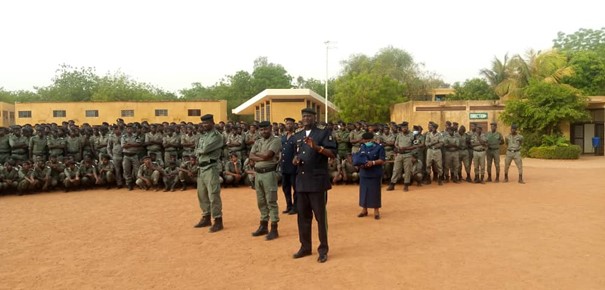SSG/R CHAMPIONS: Meet Laouali Madougou
Building police forces that respond to the needs of the population
Laouali Madougou, Director of the Niger Police Academy for the past eight years, has made human rights issues central to the training of police officers. This is key in a region that faces many security challenges including armed conflicts, terrorist attacks, and organized crimes that impact the population.
To be effective in their role of keeping the peace, police officers must have the trust of the people they serve, in particular communities who are vulnerable, suffering from gender, cultural, or socio-economic discrimination. At the heart of this trust relationship is the respect for rule of law and human rights.
A study conducted in Niger in the early days of Madougou’s tenure as Director found that some members of the security forces felt that respecting human rights was sometimes incompatible with their duties. As a result, they were perceived as being violent toward the population, which damaged trust in security institutions.
Madougou drew on his studies of human rights and democracy at the university to ensure that human rights training was included in the curriculum of the National Police Academy and the department of Continuing Education in 2014. "It was an opportunity to show that police officers can change their opinions and that the public’s perception of the police can change as well," he says.

Launching the zero sexual harassment policy at the National Police Academy. Photo: ENP
CHANGING TAKES TIME AND EFFORT
Madougou has worked with many local and international actors to develop tools and training to improve the trust relationship between the Niger police and the population.
Since 2004, all new national police officers who go through the academy are trained in human rights. To date this represents more than 10,000 officers. Madougou then built on that foundation with training in police integrity, communication and conflict management, and the modern concept of ‘citizen policing’, which emphasizes the importance of a proactive, preventative approach to policing and a good relationship between the police and the communities they serve.
To support this training at the policy level, the National Police adopted a code of ethics and, with the help of DCAF, created a guide adapted to the different roles and positions within the police force.
"Police officers have realized that to serve, protect, and better meet the expectations of the population, they have to involve the members of the communities and create a bond of trust with them."
Laouali Madougou, Divisional Police Commissioner, Director of the National Police Academy
IMPROVING INTERNAL CONTROL
Good training is key, but it must be reinforced by effective accountability mechanisms. Madougou worked with DCAF and other partners such as the Danish Institute for Human Rights to improve internal control mechanisms. The priority has been to develop checks and balances among peers to better address and prevent bad behavior. Because the project was supported at the highest levels of the National Police, it was possible to bring together officials from all regions of the country. This has strengthened the chain of command and control over officers and departments across Niger.
"The focus was on the performance of officers and services because sustainability depends on the confidence that the population has in these institutions, in the different police services and the police officers themselves," says Madougou.
As a result, other countries in the Sahel region - Burkina, Mali, Chad, and Mauritania - are applying Niger's experience to improve peer review and accountability mechanisms inside their police forces.
"The work on internal control is an ongoing process and a very good experience that is being replicated everywhere," says Madougou.
MEASURING RESULTS AND CONTINUING THE EFFORTS
In 2018, an evaluation was conducted on internal control mechanisms and citizen policing in four regions of Niger. Local stakeholders were interviewed about the behavior and the performance of the police services including police officers themselves, but also magistrates and mayors, those responsible for justice and oversight. The results showed an improvement in the perception of the police services in all the regions.
In addition to the survey, the annual reports of the General Inspectorate of Security Services are used each year to measure the performance of the police services. Madougou knows that there is still a lot to do but he says he is gratified to see that the number of complaints against the police have drastically dropped over time and that the relationship between the police and the population has improved significantly. Communities are now asking for police services rather than avoiding them. "This is an indicator of success, says Madougou, and proof that we need to continue our work to keep the momentum going."
STORIES FROM THE FIELD
We are highlighting some of our many partners who have made extraordinary contributions to the field of security sector reform and good governance in their countries.
-
SSG/R Champions: Meet Kateryna Levchenko (Ukraine)
-
SSG/R Champions: Meet Dr Omar Rahal (Occupied Palestinian Territories)
-
SSG/R Champions: Meet Teresita Quintos-Deles (the Philippines)
-
SSG/R Champions: Meet the Kajembas (DRC)
-
SSG/R Champions: Meet Lt. Colonel Lurangeli Franco Rodrígez (Colombia)
 Share on Facebook
Share on Facebook Share on Linkedin
Share on Linkedin Share on Twitter
Share on Twitter